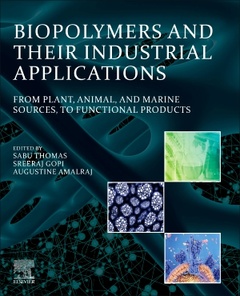Description
Biopolymers and Their Industrial Applications
From Plant, Animal, and Marine Sources, to Functional Products
Coordinators: Thomas Sabu, Gopi Sreeraj, Amalraj Augustine
Language: English
Subjects for Biopolymers and Their Industrial Applications:
Keywords
biopolymer; source; classification; isolation; characterization; synthesis; selection; method; applications; industry; blend; composite; processing; food; nutraceutical; medical; pharmaceutical; textile; cosmeceutical; packaging; adhesive; automotive; 3D printing; AM; super capacitor; energy storage; environment; water treatment; sustainability
398 p. · 19x23.3 cm · Paperback
Description
/li>Contents
/li>Readership
/li>Biography
/li>Comment
/li>
Biopolymers and Their Industrial Applications: From Plant, Animal, and Marine Sources to Functional Products is a detailed guide to the use of biopolymers for advanced applications across a range of key industries. In terms of processing and cost, bio-based polymers are becoming increasingly viable for an ever-broadening range of novel industrial applications. The book begins with an overview of biopolymers, explaining resources, demands, sustainability, life cycle assessment (LCA) modeling and simulation, and classifications. Further in-depth chapters explore the latest techniques and methodologies for isolation and physicochemical characterization, materials selection, and processing for blends and composites.
Chapters 6 to 14 each focus on the preparation and applications of biopolymers in a specific industrial area, including food science and nutraceuticals, medicine and pharmaceuticals, textiles, cosmeceutical, packaging, adhesives and automotive, 3D printing, super capacitor and energy storage devices, and environmental applications. The final chapter compares and analyzes biopolymers alongside synthetic polymers, also offering valuable insight into social, economic, and environmental aspects. This is an essential resource for those seeking to understand, research, or utilize biopolymers in industrial applications. This includes researchers, scientists, and advanced students working in biopolymers, polymer science, polymer chemistry, biomaterials, materials science, nanotechnology, composites, and biotechnology. This is a highly valuable book for scientists, R&D professionals, designers, and engineers across multiple industries and disciplines, who are looking to utilize biopolymers for components and products.
2. Biopolymers and their classifications
3. Isolation and physicochemical characterization of biopolymers
4. Methodologies for selecting biopolymers and their characteristic features for various industrial applications
5. Biopolymer blends and composites: Processing technologies and their properties for industrial applications
6. Biopolymers in food and nutraceutical industries
7. Biopolymers and their role in medicinal and pharmaceutical applications
8. Biopolymers in textile industries
9. Biopolymers: Applications in cosmeceutical industries
10. Biodegradable polymers as packaging materials
11. Biopolymers in the automotive and adhesive industries
12. Biopolymers: Opportunities and challenges for 3D-printing
13. Biopolymer composites in super capacitor and energy storage devices
14. Biopolymers in environmental applications: Industrial waste water treatment
15. Advantages of biopolymers over synthetic polymers: Social, economic and environmental aspects
Academic: Researchers, scientists and advanced students in biopolymers, polymer science, polymer chemistry, biomaterials, materials science, nanotechnology, composites, and biotechnology. Industry: Scientists, R&D professionals, designers, and engineers across industries and disciplines, looking to utilize biopolymers for components and products
Dr. Sreeraj Gopi is the Co-Founder and Director of Molecules Food solutions Pvt Ltd, Zingon Naturals Pvt Ltd. He was the Chief Scientist at Plant Lipids Pvt Ltd. and Chief Scientific Officer at Aurea Biolabs Pvt Ltd., He has also served as an adjunct professor at universities including Stockholm University, Sweden, Siberian Federal University, Russia, and Mahatma Gandhi University, India. He completed his doctorate in organic chemistry and nanotechnology, and nano drug delivery working in the area of natural products, isolation, and biological activities. He published more than 175 international articles and filed more than 75 patents, in the US and Europe. At Plant Lipids, he developed many innovative products and technologies, and is responsible for driving the research team to excellence, as well as, implementing new projects, presenting scientific seminars to variou
- Introduces a broad range of industrial application areas, including food, medicine, textiles, cosmetics, packaging, automotive, 3D printing, energy, and more
- Offers an industry-oriented approach, addressing challenges and explaining the preparation and application of biopolymers for functional products and parts
- Considers important factors such as resources, classification, sustainability, and life cycle assessment (LCA) modeling and simulation
- Compares and analyzes biopolymers alongside synthetic polymers, also offering valuable insight into social, economic, and environmental aspects




